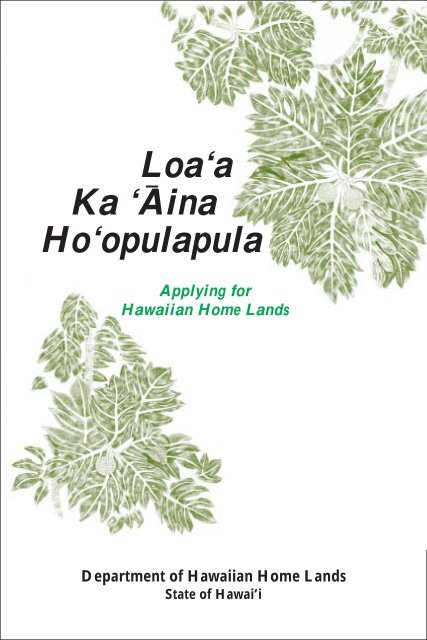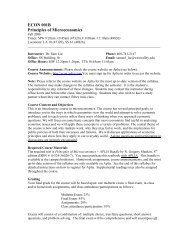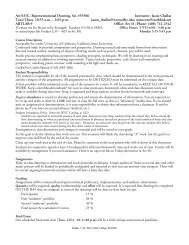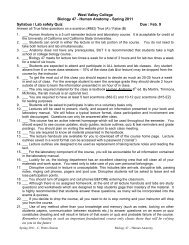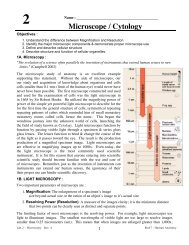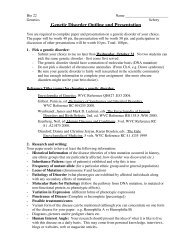Loa'a Ka 'Aina Ho'opulapula - Instructor Web Page Directory
Loa'a Ka 'Aina Ho'opulapula - Instructor Web Page Directory
Loa'a Ka 'Aina Ho'opulapula - Instructor Web Page Directory
You also want an ePaper? Increase the reach of your titles
YUMPU automatically turns print PDFs into web optimized ePapers that Google loves.
Loa‘a<br />
<strong>Ka</strong> ‘Aina<br />
Ho‘opulapula<br />
Applying for<br />
Hawaiian Home Lands<br />
Department of Hawaiian Home Lands<br />
State of Hawai‘i
Aloha kakou!<br />
Welcome to the Hawaiian home lands program. The program<br />
has its roots in the Hawaiian Homes Commission Act of 1920, as<br />
amended. It provides native Hawaiians with several benefits that we<br />
hope will assist you and your ‘ohana for generations to come. Entry<br />
into the program, however, depends largely upon you. In the course of<br />
applying for a homestead, you may find yourself embarking on a jour-<br />
ney of discovery into your family’s history. While it often takes time, for<br />
most people it is a process well worth the effort.<br />
This booklet is designed to make your entry into the program as<br />
smooth and fruitful as possible. Like the ‘ulu tree, the Hawaiian home<br />
lands program can provide sustenance for generations to come.<br />
We look forward to serving you.<br />
Aloha,<br />
The Department of Hawaiian Home Lands
Me ka malama `ana, ulu pono ke kumu la`au<br />
`ulu i kanu `ia a ho`opa`a `ia ma ka `aina ola mau.<br />
Ho`olako ke kumu la`au o`o<br />
i na mea `ai i na kanaka e `ai i kana hua.<br />
The breadfruit tree, planted and rooted in life sustaining land,<br />
grows strong when it is cared for.<br />
Year after year the mature tree provides nourishment to all who eat its fruit.
2<br />
3<br />
3<br />
4<br />
7<br />
9<br />
9<br />
9<br />
10<br />
10<br />
10<br />
12<br />
12<br />
13<br />
13<br />
14<br />
15<br />
15<br />
16<br />
18<br />
20<br />
21<br />
23<br />
Introduction<br />
Table of Contents<br />
Eligibility Requirements<br />
Tracing Your Genealogy<br />
Primary Documents<br />
Secondary Documents<br />
Birth Certificates (Adoption)<br />
Inconclusive Documents<br />
Variation in Names or Single Names<br />
Reasonable Basis for More Documentation<br />
Where to Get Your Documents<br />
Application Processing<br />
Types of Homestead Leases<br />
Homestead Lease Availability by Island<br />
Available Residential Awards<br />
Benefits of a Hawaiian Home Lands Homestead Lease<br />
Applying for a Homestead Lease<br />
Change in Applicant's Genealogical Information<br />
Designation of Successor (Application Process only)<br />
The Applicant's Responsibilities<br />
Commonly Asked Questions by New Applicants<br />
Commonly Asked Questions by Applicants Who Are<br />
on the Waiting List<br />
Joining the `Ohana<br />
Appendix
Introduction<br />
In the early 1900's Prince Jonah Kuhio <strong>Ka</strong>laniana‘ole and his<br />
supporters sought ways to revitalize the Hawaiian people. Prince<br />
Kuhio's vision of ‘aina ho‘opulapula or "restoration through the land"<br />
resulted in the passage of the "Hawaiian Homes Commission Act of<br />
1920" (HHCA) by the United States Congress. It was signed into law on<br />
July 9, 1921, by President Warren G. Harding.<br />
The Act reserved 203,500 acres, "more or less," of public lands in<br />
the Territory of Hawai‘i for homesteading by native Hawaiians. These<br />
lands were called Hawaiian home lands. Today, the Department of<br />
Hawaiian Home Lands (DHHL) is responsible for administering the<br />
Hawaiian home lands' program. DHHL continues to strive for Prince<br />
Kuhio's vision of returning the Hawaiian people to the land through the<br />
many benefits and programs it offers.<br />
2<br />
Prince Jonah Kuhio <strong>Ka</strong>laniana‘ole<br />
❧ ❧ ❧
In order to make the application process as smooth as possible, there<br />
are certain things you need to know and do as an applicant. Since the<br />
land benefits offered by the Department of Hawaiian Home Lands<br />
(DHHL) are very valuable, it is important to understand that DHHL is<br />
responsible for maintaining the integrity of the HHCA in administering<br />
its programs. An essential element of this responsibility is requiring<br />
applicants to demonstrate, through documentation, that they are eligible<br />
for the program.<br />
Eligibility Requirements<br />
To be eligible to apply for a Hawaiian home lands homestead lease,<br />
you must meet two requirements:<br />
❧<br />
❧<br />
You must be at least 18 years of age; and<br />
You must be a native Hawaiian, defined as "any descendant of<br />
not less than one-half part of the blood of the races inhabiting the<br />
Hawaiian Islands previous to 1778." This means, you must have<br />
a blood quantum of at least 50 percent Hawaiian. This<br />
requirement remains unchanged since the HHCA's passage<br />
in 1921.<br />
Tracing Your Genealogy<br />
The general rule of thumb in determining 50 percent blood quantum<br />
is to submit enough documentation tracing your genealogy to your full<br />
Hawaiian ancestor(s). Some applicants need only go back two<br />
generations – that is, to their grandparents.<br />
Others may need to go back further, gathering pieces of information<br />
which eventually grow into a large family tree with roots beginning with full<br />
Hawaiian ancestors.<br />
3
However, before starting your search for acceptable documents, kuka, or<br />
consult with your `ohana. They are an invaluable source of information.<br />
Once you've "talked story," you should be better prepared to begin gathering<br />
the documentation needed to show eligibility for the program.<br />
There are two categories of documents used in determining eligibility:<br />
primary and secondary.<br />
Primary Documents<br />
The primary documents used to show you are of age and a qualified<br />
native Hawaiian are:<br />
A certified copy of Certificate of Birth;<br />
A certified copy of Certificate of Hawaiian Birth, including<br />
testimonies; or<br />
A certified copy of Certificate of Delayed Birth.<br />
You will need the certified birth certificates for:<br />
Yourself;<br />
Your biological father; and<br />
Your biological mother.<br />
The state Department of Health (DOH), Vital Records Section,<br />
records documents by island and district (geographically) and by the date<br />
of the event (chronologically).<br />
If your biological parents' documents don't clearly prove that you<br />
have at least 50 percent Hawaiian ancestry, you will also need certified<br />
birth certificates for:<br />
4<br />
❧<br />
❧<br />
❧<br />
❧<br />
❧<br />
❧<br />
❧<br />
❧<br />
Your biological father's parents; and<br />
Your biological mother's parents.
Sample of the PREFERRED birth certificate:<br />
Certificate of Live Birth<br />
S A M P L E<br />
5
SAMPLE of Completed DOH<br />
"Request For Certified Copy of BIRTH Record Form"
In order to process your application, DHHL utilizes information that is<br />
found only on the original Certificate of Live Birth, which is either black or<br />
green. This is a more complete record of your birth than the Certification of<br />
Live Birth (a computer-generated printout). Submitting the original Certificate<br />
of Live Birth will save you time and money since the computer-generated<br />
Certification requires additional verification by DHHL.<br />
When requesting a certified copy of your birth certificate from the Vital<br />
Records Section of DOH, let the clerk know you are requesting it "For<br />
DHHL Purposes," and that you need a copy of the original Certificate of<br />
Live Birth and not the computer-generated Certification. If mailing in your<br />
request form, please fill in "For DHHL Purposes" in the "Reason for<br />
Requesting a Certified Copy" section. (See example on page 6.)<br />
Please note that DOH no longer offers same day service. If you plan on<br />
picking up your certified DOH document(s), you should allow at least 10<br />
working days for DOH to process your request(s), OR four to six weeks if you<br />
want your certified certificate(s) mailed to you.<br />
In the event the Vital Records Section does not have a birth certificate for<br />
any of your parents or grandparents, they will issue a "No-record" certification.<br />
"No-record" certification means after searching its records, the DOH cannot find<br />
the requested birth certificates. Please submit this "No-record" certification with<br />
your other documents to DHHL.<br />
If you are adopted, your biological birth record is probably sealed. In this<br />
instance, DHHL staff may be able to assist you in getting the ethnicity of your<br />
biological parents. Additionally, depending on your particular circumstance the<br />
Family Court may be able to help you get the information you need. If your<br />
adoption occurred in the State of Hawai‘i, you may be able to get a copy of your<br />
original birth certificate. Access to out of state adoption records, however, vary<br />
according to the respective jurisdiction.<br />
Secondary Documents<br />
There are times when the birth certificates for yourself and/or your parents<br />
or grandparents are not available and you have gotten "No-record" certifications<br />
from DOH. DHHL may accept secondary documents which assist in<br />
establishing family ties or blood quantum in place of primary documents.<br />
7
The following are some of the secondary documents which may be<br />
used. The list is in the preferred order of priority:<br />
8<br />
❧<br />
❧<br />
❧<br />
❧<br />
❧<br />
❧<br />
❧<br />
❧<br />
❧<br />
Certified marriage certificates for your biological parents,<br />
grandparents, etc. (If these are not available, you will need a<br />
"No-record" certification from the Department of Health.)<br />
Certified death certificates for your biological parents,<br />
grandparents, etc. (If these are not available, you will need a<br />
"No-record" certification from the Department of Health.)<br />
Family history charts and documents such as marriage, divorce<br />
and death records from the State of Hawai`i Archives, state<br />
courts, public libraries or U.S. Census records;<br />
Official baptismal records from your church or other church<br />
documents showing your race or the race of your ancestors;<br />
Official records from the files of military services, schools or<br />
hospitals;<br />
Employment records;<br />
Written statement from your physician or, in the case of a<br />
relative's death, a written statement from the mortuary which<br />
handled the burial;<br />
Newspaper clippings from Obituaries and Vital Statistics<br />
sections;<br />
Affidavits, meaning sworn and notarized statements, from<br />
knowledgeable persons who can verify an individual's ancestral<br />
claims. These would primarily be from parents, grandparents<br />
and other close relatives.
Birth Certificates (Adoption)<br />
If you are adopted, you must establish proof of your native Hawaiian<br />
ancestry through your biological parents, not your adoptive parents. In<br />
the past Family Court records regarding adoptions have been sealed.<br />
Under current Hawai`i State law, however, there are procedures by<br />
which an adopted individual may obtain information contained in the<br />
sealed records. In some cases DHHL staff may be able to assist you with<br />
this process. (See Sections 578-14.5 and 578-15, Hawaii Revised<br />
Statutes.)<br />
Inconclusive Documents<br />
Sometimes an applicant may be confused by DHHL's request for<br />
more documentation. Usually, if a request is made for more<br />
documentation, it is because a question regarding a person's application<br />
or genealogy has been raised. For example, the document presented may<br />
refer to the applicant as "Part-Hawaiian," "Caucasian-Hawaiian,"<br />
"Hawaiian-Chinese" or "Portuguese-Hawaiian." Often an applicant will<br />
interpret statements like this to mean the individual is 50 percent<br />
Hawaiian. In fact, because the percentage of Hawaiian is not specified,<br />
additional documentation will be required to identify the full-blooded<br />
Hawaiian ancestor(s). Once this ancestor(s) is identified, the blood<br />
quantum amount is brought forward to the current generation, dividing<br />
the blood quantum amount in half with each new generation. The<br />
amount of Hawaiian blood an applicant has is identified and documented<br />
through this process.<br />
Variation in Names or Single Names<br />
If a document shows a variation in names, such as the difference<br />
between a name on a birth certificate and a marriage certificate, more<br />
documentation will be requested to explain the difference. This also<br />
holds true if the document in question shows only a surname or a single<br />
name.<br />
9
Reasonable Basis for More Documentation<br />
DHHL staff may ask for additional documentation if, for example, a<br />
nontraditional Hawaiian surname of "Bennett" is listed with the race<br />
given as "Hawaiian". Another reason why more documentation might be<br />
requested is if the age of the applicant doesn't match the age presented<br />
on the document in question.<br />
Where to Get Your Documents<br />
The state Department of Health, the state Archives, and the state<br />
Bureau of Conveyances are just a few places where you can look for and<br />
obtain primary and secondary documents. Certified copies of records<br />
can be obtained for a fee.<br />
The addresses, telephone numbers and office hours for several of<br />
these sources can be found in the Appendix of this booklet.<br />
Other sources are the state Circuit and Family Courts, the state<br />
libraries, hospitals, schools, religious organizations, and the LDS Family<br />
History Centers operated by the Mormon Church. Although personnel at<br />
the History Centers will assist in your research, they will not do your<br />
research for you.<br />
You may also use copies of documents in DHHL's files of a relative<br />
who is a homestead lessee or applicant. However, you must obtain<br />
written permission from your relative in order for DHHL to use that<br />
relative's genealogical information for your application.<br />
Application Processing<br />
DHHL will return an incomplete application, along with instructions,<br />
advising the applicant to produce further evidence to verify his or her<br />
Hawaiian ancestry. If an applicant disagrees with the action taken by<br />
DHHL on his or her completed application, he or she has 30 days from<br />
receipt of the written notice to petition DHHL for an appearance before<br />
the Hawaiian Homes Commission to address the action taken on the<br />
application.<br />
10
Ho `akoakoa na hanauna o neia `ohana--he<br />
mala ia, piha i ka na`auao<br />
a me ke `oko`a maika`i.<br />
Generations of family are gathered here--a<br />
garden, abundant in its wisdom and diversity.
Types of Homestead Leases<br />
Once you have your documents proving your native Hawaiian<br />
ancestry in order, you'll need to decide what kind of homestead lease<br />
you would like to receive.<br />
There are three kinds of homestead leases:<br />
residential, agricultural and pastoral.<br />
You may apply for one of the following:<br />
One residential lot;<br />
One agricultural lot;<br />
One pastoral lot;<br />
One residential lot and one agricultural lot; OR<br />
One residential lot and one pastoral lot.<br />
You may not apply for all three types of homestead leases. Nor may<br />
you apply for both an agricultural lot and a pastoral lot.<br />
Although you may apply for leases on separate islands, you cannot<br />
hold leases on separate islands. Say, for example, the first lease you<br />
obtain is for a residential lot on O`ahu. You also applied for<br />
agricultural land on Maui. At the time you are offered the agricultural<br />
lot on Maui, you will have to decide which island you are going to<br />
homestead, because you cannot have leases on two islands.<br />
Homestead Lease Availability by Island<br />
12<br />
❧<br />
❧<br />
❧<br />
❧<br />
❧<br />
Island Type of Available Homestead Lease<br />
Hawai`i Residential, Agricultural and Pastoral<br />
<strong>Ka</strong>ua`i Residential, Agricultural and Pastoral<br />
Lana`i Residential<br />
Maui Residential, Agricultural and Pastoral<br />
Moloka`i Residential, Agricultural and Pastoral<br />
O`ahu Residential and Agricultural
Available Residential Awards<br />
The homestead program offers a range of residential awards that<br />
include, but are not limited to:<br />
❧<br />
❧<br />
❧<br />
❧<br />
Fully improved lots with new homes on them.<br />
Fully improved vacant lots.<br />
Vacant lots with minimal improvements.<br />
Rent-to-own homes.<br />
DHHL recognizes that beneficiaries come from diverse financial<br />
backgrounds. As a result, DHHL has formed cooperative partnerships with<br />
several nonprofit and governmental organizations to provide beneficiaries with as<br />
many housing options as possible. For example, both self-help housing and<br />
Habitat for Humanity homes have been constructed on Hawaiian home lands.<br />
If you are selected for an award and you choose not to accept it for whatever<br />
reason, please kokua and let DHHL know as soon as possible that you are<br />
deferring the award. This gives the next qualified applicant an opportunity to get<br />
a homestead lease.<br />
Benefits of a Hawaiian Home Lands Homestead Lease<br />
Perhaps you're still considering applying for a homestead lease.<br />
Here's something to think about---the advantages of being a Hawaiian<br />
homestead lessee. Among the many benefits are:<br />
❧<br />
❧<br />
❧<br />
❧<br />
❧<br />
❧<br />
Annual lease rent of $1.00 per year;<br />
99-year lease;<br />
Lease term which can be extended for an additional 100 years,<br />
allowing you to pass your homestead from generation to generation;<br />
Seven-year exemption from real property tax;<br />
Complete exemption of tax on land;<br />
Minimal real property tax after the first seven years (applies only<br />
to County of <strong>Ka</strong>ua`i and City and County of Honolulu, O`ahu);<br />
13
❧<br />
❧<br />
❧<br />
❧<br />
Taxing of assessed value of improvements on property (Hawai`i and<br />
Maui counties only);<br />
Homeowner's exemption (to be filed with respective county's real<br />
property tax office);<br />
Low interest government loans (contact DHHL for more<br />
information); and<br />
Ability to use the equity in your property to obtain loans (contact<br />
DHHL for more information).<br />
Applying for a Homestead Lease<br />
Once you are ready to apply for a homestead lease, you may either call or go to<br />
the DHHL Application's Office in Honolulu or the DHHL District Office closest to<br />
you and ask for a homestead application packet. (See Appendix for the directory of<br />
DHHL District Offices.)<br />
The homestead application packet contains the following:<br />
❧<br />
❧<br />
❧<br />
❧<br />
❧<br />
❧<br />
Letter of Welcome<br />
Application for Lease of Hawaiian Home Lands<br />
Addendum to Application<br />
Designation of Successor to Application Rights for Homestead Lease<br />
Kumu `Ohana Worksheet<br />
Consent for Release of Information<br />
There are two ways to submit an application. You can mail in the completed<br />
and notarized form, along with certified copies of the necessary documentation.<br />
These certified copies will be returned to you. You may also submit your<br />
application in person. Due to the increasing demand for homestead leases, an<br />
appointment is necessary.<br />
14
Please call one of the six DHHL district offices listed on page 1 of the<br />
appendix to schedule an appointment, then bring in the necessary documentation<br />
to the Application's Office in Honolulu or any of the five district offices on the<br />
neighbor islands. You may have your documents notarized at any district office<br />
free of charge.<br />
Once your application is completed and accepted, it is time stamped, signed<br />
by a DHHL representative, and filed in the order it is received. A confirmation<br />
letter with a copy of the application will be mailed to you.<br />
Change in Applicant's Genealogical Information<br />
Based on the information provided to DHHL, a determination may be made<br />
that an applicant meets the 50 percent blood quantum and is eligible for the<br />
Hawaiian home lands program. That applicant is then placed on the appropriate<br />
waiting list.<br />
It has been DHHL's experience that sometimes new information becomes<br />
available after an application has been accepted. When this occurs, DHHL and<br />
the Hawaiian Homes Commission have a fiduciary responsibility to carefully<br />
examine the new information and insure that the applicant does indeed qualify<br />
for the program. Consequently, DHHL staff may ask for further documentation<br />
concerning an applicant's 50 percent blood quantum.<br />
Designation of Successor (Application Process ONLY)<br />
As an applicant, you are encouraged to designate a qualified successor to<br />
succeed your application rights upon your death. This is done by completing a<br />
Designation of Successor to Application Rights for Homestead Lease form.<br />
It is important to give a copy of the Designation of Successor to your<br />
designated successor.<br />
To qualify, your successor must meet the following requirements:<br />
❧ The successor meets the minimum 50 percent blood quantum<br />
requirement (DHHL encourages applicants to provide documentation<br />
of their successors' native Hawaiian blood quantum);<br />
❧ The successor is at least 18 years of age; and<br />
15
The successor is your spouse, child*, grandchild, father or mother,<br />
widow or widower of a child, brother or sister, widow or<br />
widower of a brother or sister, or niece or nephew.<br />
*"Child Successor" as interpreted by the Office of the Attorney<br />
General for the State of Hawaii, includes:<br />
A legitimate, biological child; and<br />
A legally adopted child who has presented and established<br />
sufficient documentation which shows the child is at least 50<br />
percent Hawaiian based on biological genealogy.<br />
The Applicant's Responsibilities<br />
Once you have successfully completed the application process for a<br />
homestead lease and you are on the island-wide waiting list of your<br />
choice, you're probably wondering, "Now what?"<br />
Well, as an applicant, you have some important responsibilities.<br />
16<br />
❧<br />
❧<br />
❧<br />
❧<br />
❧<br />
❧<br />
❧<br />
It's very important to keep your address current with DHHL.<br />
If you move, immediately notify DHHL in writing so there won't<br />
be needless delays when your waiting list number comes up. It<br />
isn't enough to notify the post office of your change in address.<br />
Designate a qualified successor to your application and let that<br />
person know you have designated him or her as the successor to<br />
your application.<br />
Start getting your finances and credit reference reports in order.<br />
For example, start limiting monthly expenses. Put money into a<br />
savings account on a regular basis. It may also mean delaying<br />
the purchase of a new car, television or sound system. This<br />
way you will be ready to financially qualify for a home when a<br />
homestead lease is offered to you.
E pulama i ka `aina.<br />
Ho mai i ke ola.<br />
E hi`ipoi i ka `ohana.<br />
Ho mai i ke ola ho'i.<br />
Cherish the land. It gives life.<br />
Cherish the family. It, too, gives life.
Commonly Asked Questions by New Applicants<br />
Where can I go for help with my genealogy?<br />
In the Appendix of this booklet there is a list of state agencies where<br />
you can go for help with your research. Other sources include the state<br />
libraries; the LDS Family History Centers, operated by the Mormon<br />
Church; hospitals; schools; religious organizations; and reputable<br />
genealogists.<br />
Where may I have my application notarized?<br />
You may have your application notarized free of charge at DHHL.<br />
There is at least one notary public in each DHHL District Office. You<br />
may also have your documents notarized at your financial institution, or if<br />
you have an attorney, he or she may have a notary public on staff.<br />
How many applications may I submit?<br />
You may submit applications for a maximum of two types of leases<br />
---residential and agricultural OR residential and pastoral. You cannot<br />
submit applications for both agricultural and pastoral lots.<br />
May I submit residential/agricultural or residential/pastoral<br />
applications for each island?<br />
No. Your application(s) should be for the island you most likely want<br />
to live on when you get your award.<br />
How long does it take to get my lease?<br />
Lease awards depend upon the Hawaiian Homes Commission's<br />
development goals, DHHL resources, and location and availability of<br />
lands, among other factors.<br />
Which island has the shortest waiting list?<br />
Molokai. However, when choosing an island you should consider<br />
employment opportunities and where you want to ultimately live, rather<br />
than making a selection based on the length of the waiting list.<br />
18
Will my chances be better if I choose a shorter waiting list?<br />
Not necessarily. It would depend on your employment opportunities<br />
on that island, the quality of available lands, and the design and<br />
construction projections for that island.<br />
What is the difference between residential, agricultural and<br />
pastoral leases?<br />
A residential lease is for the home that you live in.<br />
An agricultural lease is primarily for farming.<br />
A pastoral lease is for ranching.<br />
You may also build a house on an agricultural or pastoral lot.<br />
However, if you already have a house on your residential lot and you<br />
want to build a house on your agricultural or your pastoral lot, you must<br />
surrender or transfer one of the two leases because you may only have<br />
one residence.<br />
How much will a residential house and lot cost?<br />
The amount varies depending on the project.<br />
Can you own a non-homestead home at the time you apply for a<br />
Hawaiian homestead lease?<br />
Yes. Owning non-homestead property does not disqualify you from<br />
receiving a lease. However, should you receive a residential homestead<br />
lease, you must be the owner-occupant.<br />
Why do I have to submit more documents than my brother (or<br />
sister) who already has an award?<br />
In the past, fewer documents may have been required when your<br />
relatives applied. Over the years, however, DHHL's procedures have<br />
become more refined as errors and omissions surfaced. Therefore, any<br />
additional information you are asked to provide may be used to complete<br />
your relatives' files, with your authorization.<br />
19
Is the 50 percent blood quantum requirement going to be<br />
lowered?<br />
Presently, DHHL does not have plans to lower the 50 percent blood<br />
quantum. DHHL's first obligation is to those on the existing waiting list<br />
and the many qualified native Hawaiians who have yet to apply for a<br />
homestead. Any changes in the blood quantum requirement will require<br />
state legislative and congressional action.<br />
Commonly Asked Questions by Applicants Who Are on<br />
the Waiting List<br />
What is my number on the list?<br />
Your number is established on the date your application is accepted<br />
by DHHL. This number changes when applicants ahead of you are<br />
removed from the list per their request or are awarded leases.<br />
Waiting lists are available for review at DHHL district offices and<br />
select branches of the state library.<br />
Why does my number keep getting higher instead of lower?<br />
Numbers may increase as a result of actions taken by the Hawaiian<br />
Homes Commission (HHC). The HHC is authorized to approve<br />
adjustments to the waiting lists. For example, during the Acceleration of<br />
Awards Program (1984 - 1987) DHHL awarded leases to unimproved<br />
lots. Once the lands became improved, the lessees had one year to<br />
construct a house on a residential lot. Some lessees have not been able<br />
to meet this requirement for a variety of reasons. Therefore, they have<br />
requested that the HHC rescind their leases and reinstate them back to<br />
the waiting list according to the date of their original application. An<br />
action like this may affect your number, if you are an applicant on the<br />
waiting list.<br />
May I change (transfer) my application to a different island?<br />
Yes, but you are placed on the island list you are transferring to as of<br />
the date your transfer request is received by DHHL and not your original<br />
application date.<br />
20
How come I wasn't given an award, yet I know someone who<br />
applied after me already has a lease?<br />
There may be a number of reasons. For example, a lessee may have<br />
received a lease as a result of a transfer from another lessee or through<br />
successorship from a deceased relative.<br />
Does DHHL make loans to applicants?<br />
DHHL does not make loans to applicants. DHHL does, however,<br />
make loans to lessees. These loans are generally reserved for lessees<br />
who are not able to secure financing from an outside lender. For more<br />
information contact DHHL.<br />
Joining the `Ohana<br />
❧ ❧ ❧<br />
As the part-Hawaiian population grows, substantiating one's<br />
eligibility requirement of proving 50 percent or more native<br />
Hawaiian ancestry is more challenging. There are many<br />
resources available to assist you in establishing your native<br />
Hawaiian blood quantum. DHHL stands ready to help you<br />
through the application process.<br />
New developments are being planned and "raw" land is<br />
constantly being prepared for homestead use. DHHL<br />
encourages you to become a part of the Hawaiian Home Lands'<br />
`ohana.<br />
❧ ❧ ❧<br />
21
Ma mua o kau huki `ana i ke kalo,<br />
Ma mua o kau lawe `ana i ka i`a,<br />
Ma mua o kau `ako `ana i ka `ulu---<br />
E nonoi mua i ka `ae `ana no ka mea,<br />
ho`ike ia i ka mahalo no na mea ola apau loa.<br />
Before you harvest the taro root,<br />
before you catch the fish,<br />
before you pick the breadfruit--you<br />
must first ask their permission<br />
for this shows respect for all living things.
i<br />
ii<br />
iii<br />
iv<br />
v<br />
vi<br />
vii<br />
APPENDIX<br />
Hawaiian Home Lands' District Offices<br />
Document Resource Centers<br />
LDS Family History Centers<br />
Sample "Application for Lease of<br />
Hawaiian Home Lands"<br />
Sample "Designation of Successor to<br />
Application Rights for Homestead Lease"<br />
Sample "Kumu `Ohana Worksheet"<br />
Sample of Completed "Kumu `Ohana Worksheet"
HAWAIIAN HOME LANDS' DISTRICT OFFICES<br />
East Hawai`i District Office<br />
Street and Mailing Address:<br />
160 Baker Avenue<br />
Hilo, Hawai`i 96720<br />
Tel: 974-4250<br />
West Hawai`i District Office<br />
Street Address:<br />
Mamalahoa Highway<br />
<strong>Ka</strong>muela, Hawai`i 96743<br />
Mailing Address:<br />
P. O. Box 125<br />
<strong>Ka</strong>muela, Hawai`i 96743<br />
Tel: 887-6053<br />
<strong>Ka</strong>ua`i District Office<br />
Street and Mailing Address:<br />
3060 Eiwa Street, Room 203<br />
Lıhu`e, Hawai`i 96766-1886<br />
Tel: 274-3131<br />
i<br />
Office Hours:<br />
Monday through Friday<br />
7:45 AM to 4:30 PM<br />
Maui District Office<br />
Street and Mailing Address:<br />
Pu'uone Plaza, Room C-206<br />
1063 East Main Street<br />
Wailuku, Hawai`i 96793<br />
Tel: 984-2120<br />
Moloka`i District Office<br />
Street Address:<br />
Maunaloa Highway<br />
<strong>Ka</strong>lama‘ula, Hawai`i<br />
Mailing Address:<br />
P. O. Box 2009<br />
<strong>Ka</strong>unakakai, Hawai`i 96748<br />
Tel: 560-6104<br />
O`ahu Office<br />
Homestead Applications Branch<br />
Street Address:<br />
1099 Alakea Street, Suite 1230<br />
Honolulu, Hawai`i 96813<br />
Mailing Address:<br />
P. O. Box 1879<br />
Honolulu, Hawai`i 96805<br />
Tel: 586-3830 or 586-3831
DOCUMENT RESOURCE CENTERS<br />
Vital Records Section<br />
State Department of Health<br />
Mailing Address:<br />
P.O. Box 3378<br />
Honolulu, Hawai`i 96801<br />
Street Address:<br />
1250 Punchbowl Street, Room 103<br />
Honolulu, Hawai`i 96813<br />
Tel: 586-4533<br />
Hours: M-F, 7:45 AM - 2:30 PM<br />
Hawai‘i State Archives<br />
Kekauluohi Building<br />
`Iolani Palace Grounds<br />
Honolulu, Hawai`i 96813<br />
Tel: 586-0329<br />
Hours: M-F; 9:00 AM - 4:00 PM<br />
(Records and Photographs retrieved<br />
until 4:00 PM.)<br />
Bureau of Conveyances<br />
State of Hawai`i<br />
Public Reference Room 123<br />
1151 Punchbowl Street<br />
Honolulu, Hawai`i 96813<br />
Tel: 587-0314<br />
Hours: M-F, 8:15 AM - 4:15 PM<br />
Circuit Court<br />
<strong>Ka</strong>`ahumanu Hale<br />
777 Punchbowl Street<br />
Honolulu, Hawai`i 96813<br />
Tel: 539-4300<br />
Legal Documents Division<br />
Hours: M-F; 7:45 AM - 4:30 PM<br />
File Room<br />
Hours: M-F; 9:00 AM - 12:00 N<br />
1:00 PM - 4:00 PM<br />
Family Court<br />
<strong>Ka</strong>`ahumanu Hale<br />
777 Punchbowl Street<br />
Honolulu, Hawai`i 96813<br />
Hours: M-F; 7:45 AM - 4:30 PM<br />
Central Registry/Documents<br />
Tel: 539-4496<br />
Matrimonial Actions<br />
Tel: 539-4496<br />
Adoption Records<br />
Tel: 539-4496<br />
<strong>Ka</strong>laupapa Settlement<br />
P.O. Box 4444<br />
<strong>Ka</strong>laupapa, Hawai`i 96742<br />
Tel: 567-6320<br />
ii
iii<br />
LDS FAMILY HISTORY CENTERS<br />
(Search the WorldWide <strong>Web</strong> at www.familysearch.org for<br />
more center locations and information. Please call individual<br />
centers for hours of operation.)<br />
O`AHU<br />
Honolulu<br />
1560 S. Beretania Street<br />
Honolulu, Hawai`i 96826<br />
Tel: 955-8910<br />
Honolulu West<br />
1723 Beckley Street<br />
Honolulu, Hawai`i 96819<br />
Tel: 845-9701<br />
<strong>Ka</strong>ne`ohe<br />
46-177 Halaulani Street<br />
<strong>Ka</strong>ne`ohe, Hawai`i 96744<br />
Tel: 247-3134<br />
La`ie<br />
55-600 Naniloa Loop<br />
La`ie, Hawai`i 96762<br />
Tel: 293-2133<br />
Mililani<br />
95-1039 Meheula Parkway<br />
Mililani, Hawai`i 96789<br />
Tel: 623-1712<br />
Waipahu/Makakilo<br />
94-210 <strong>Ka</strong>huali`i Street<br />
Waipahu, Hawai`i 96797<br />
Tel: 678-0752<br />
HAWAI`I<br />
Hilo<br />
1373 Kılauea Avenue<br />
Hilo, Hawai`i 96720<br />
Tel: 935-0711<br />
<strong>Ka</strong>ilua-Kona<br />
75-230 <strong>Ka</strong>lani Street<br />
<strong>Ka</strong>ilua-Kona, Hawai`i 96745<br />
Tel: 329-4469<br />
KAUA`I<br />
Lıhu`e<br />
4580 Ehiku Street<br />
Lıhu`e, Hawai`i 96766<br />
Tel: 246-9119<br />
MAUI<br />
<strong>Ka</strong>hului<br />
25 West <strong>Ka</strong>mehameha Avenue<br />
<strong>Ka</strong>hului, Hawai`i 96732<br />
Tel: 871-8841<br />
MOLOKA`I<br />
<strong>Ka</strong>unakakai<br />
35-100 <strong>Ka</strong>mehameha Highway<br />
<strong>Ka</strong>lama‘ula, Hawai`i<br />
Tel: 553-5296
SAMPLE<br />
"Application for Lease of Hawaiian Home Lands"<br />
iv
v<br />
SAMPLE<br />
"Designation of Successor to Application Rights<br />
for Homestead Lease"
SAMPLE<br />
"Kumu `Ohana Worksheet"<br />
vi
vii<br />
SAMPLE OF COMPLETED<br />
"Kumu `Ohana Worksheet"
Department of<br />
Hawaiian Home Lands<br />
Chairman's Office<br />
1099 Alakea Street, Suite 2000<br />
Honolulu, Hawai`i 96813<br />
Telephone: (808) 586-3800<br />
FAX: (808) 586-3899<br />
Information and Community<br />
Relations Office<br />
Telephone: (808) 586-3840<br />
FAX: (808) 586-3843<br />
Writer:<br />
Michele Lum Molina<br />
Illustrator:<br />
Reiko N. Tom<br />
Design & Production:<br />
VideoPoint Productions, Inc.<br />
Printer:<br />
Pacific Printing & Publishing<br />
Hawaiian Language Translator:<br />
Carol Silva<br />
Mahalo to the State Department of Health<br />
Office of Health Status Monitoring<br />
for its continued support and assistance.<br />
*This booklet is meant to assist you with the application process for obtaining<br />
Hawaiian home lands. It is not an administrative rule book. If you wish to<br />
view the Department of Hawaiian Home Lands’ Administrative Rules, please<br />
contact the district office in your area.
Department of Hawaiian Home Lands<br />
State of Hawai`i<br />
August 2000


